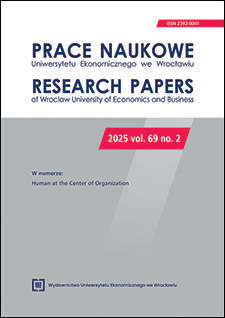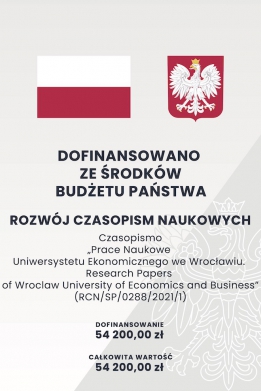New Quality of Leadership and Management in Tech Startups – Why Supporting Gender Equality Matters. A Case Study of the Project “Shesnnovation Academy”
DOI:
https://doi.org/10.15611/pn.2025.2.09Keywords:
social change, gender equality, women founders of technology startups, women in project managementAbstract
Aim: This article analysed the problem of gender equality in tech startups. The main aim of the article was to show how important it is to support women founding their tech startups to enhance the demanded social change.
Methodology: The methodological approach was based on the functional theory of change (Radcliffe--Brown, 1952, 1957), theory of planned behaviour (Ajzen, 1991) and the entrepreneurial event model (Shapero & Sokol, 1982) to show how institutionalised support creates a positive impact on the decisions made by women in technology industries. The research also focused on Project Management Institute standards to show how particular projects supporting women in technologies and innovations should be designed.
Results: The collected results were considered in the category of change, in terms of the motivation for change, the benefits of change and the approach to being a leader understood as an agent of change.
Implications and recommendations: It was discovered that programmes such as the Shesnnovation Academy, if well run, can bring on a change in mentality. The study showed that the current European Union programmes encourage the creation of such grassroots initiatives that have an impact on the local community.
Originality/value: The research focused on gender equality in the framework of the SDGs (United Nations, 2015). Their main value was to show the impact of grassroots endeavors, supporting gender equality in the technological field, and on changing the perception of women themselves.Downloads
References
Ajzen, I. (1991). The Theory of Planned Behavior. Organizational Behavior and Human Decision Processes, 50(2), 179-211.
Deloitte. (2022). Women in the Boardroom. Report. Deloitte. https://www.deloitte.com/cbc/en/about/press-room/women-in-the-boardroom-report.html
European Union. (1957). The Treaty on the Functioning of the EU. European Union.
http://data.europa.eu/eli/treaty/tfeu_2016/oj
European Commission. (2010). A New ERA for Research and Innovation. Communication from the Commission to the European Parliament, the Council, the European Economic and Social Committee and the Committee of the Regions. European Commission.
European Commission. (2010). Europe 2020: A Strategy for Smart, Sustainable and Inclusive Growth: Communication from the Commission. Publications Office of the European Union.
European Commission. (2014). Communication from the Commission to the European Parliament, the Council, the European Economic and Social Committee and the Committee of the Regions. Brussels. European Commission.
European Commission. (2017). White Paper on the Future of Europe. Reflections and Scenarios for the EU27 by 2025. European Commission. https://commission.europa.eu/publications/white-paper-future-europe_en
EISIMEA. (2022). EIC Women Leadership Programme. EISIMEA. https://eic.eismea.eu/
Fundacja Perspektywy. (2023). Różnorodność ma znaczenie. Młode liderki STEM kreują zmianę. Raport Fundacji Perspektywy i Fundacji Citi Handlowy im. Leopolda Kronenberga. https://womenintech.perspektywy.org/
Hajian, M., & Kashani, S. J. (2021). Evolution of the Concept of Sustainability. From Brundtland Report to Sustainable Devel-opment Goals. In: Sustainable Resource Management (pp. 1-24). Elsevier.
Impact Group. (2023). Women on Boards: Why CEOS Want Them There. Impact Group. https://impactgrouphr.com/blog/women-on-boards/
International Labour Organization. (2019). Beyond the Glass Ceiling: Why Businesses Need Women at the Top, https://webapps.ilo.org/infostories/en-GB/Stories/Employment/beyond-the-glass-ceiling#introduction
Kestel, E. (2023). Leading Fearlessly: Women Improve Results in the Boardroom, but Still Need a Seat at the Table (based on the Catalyst Report − Workplaces That Work for Women). https://fearlessbr.com/leading-fearlessly-women-improve-results-in-the-boardroom-but-still-need-a-seat-at-the-table/
Kwieciński, L. (2023). Gender Equality and Innovation – Towards Sustainable Development and Social Innovation Using the Example of Activities Undertaken by the European Union. Przegląd Europejski, 4, 11-28.
Lanning, M., & Phillips, L. (1991). Building Market-Focused Organizations. White paper, Gemini Consulting.
Luhman, N. (2007). Systemy społeczne. Zakład Wydawniczy NOMOS.
OECD. (2022). Inclusive Entrepreneurship Policies: Country Assessment Notes. OECD.
Parsons, T. (1951). The Social System. Routledge & Kegan Paul.
Patnaik, S. M. (access: 2024). Theories and Methods in Social Cultural Anthropology. https://ebooks.inflibnet.ac.in/antp10/
Pink, D. H. (2009). Drive: The Surprising Truth about What Motivates Us. Riverhead.
Pol, M., Walkowiak, T., & Piasecki, M. (2018). Towards CLARIN-PL LTC Digital Research Platform for: Depositing, Processing, Analyzing and Visualizing Language Data. In Reliability and Statistics in Transportation and Communication: Selected Papers from the 17th International Conference on Reliability and Statistics in Transportation and Communication, RelStat’17,
18-21 October, 2017, Riga, Latvia (pp. 485-494). Springer International Publishing.
Project Management Institute. (2021). Project Management Body of Knowledge, 7th ed. Project Management Institute.
Radcliffe-Brown, A. R. (1957). A Natural Science of Society. Glencoe. Free Press.
Radcliffe-Brown, A. R. (1952). Structure and Function in Primitive Society. Cohen and West.
Republic of Slovenia (2021). The Ljubljana Declaration on Gender Equality in Research and Innovation. https://www.gov.si/assets/ministrstva/MIZS/Dokumenti/PSEU/Ljubljana-Declaration-on-Gender-Equality-in-Research-and-Innovation-_endorsed_final.pdf
Satir, V. (2000). Rodzina. Tu powstaje człowiek. Gdańskie Wydawnictwo Psychologiczne.
Shapero, A. & Sokol, L. (1982). Social Dimensions of Entrepreneurship. In C. A. Kent, D. L. Sexton, & K. H. Vesper (Eds.), The Encyclopaedia of Entrepreneurship (pp. 72-90). Englewood Cliffs.
Shesnnovation Academy (2021). https://shesnnovation.pl/
Startup Poland (2022). Polish Startups 2022 Report. Startup Poland. https://startuppoland.org/en/report/polish-startups-2022/
Sztompka, P. (2010). Socjologia zmian społecznych. Wydawnictwo Znak.
Sztompka, P. (2012). Socjologia. Analiza społeczeństwa. Wydawnictwo Znak.
UNDP. (2023). Gender Social Norms Index. UNDP. https://hdr.undp.org/content/2023-gender-social-norms-index-gsni#/indicies/GSNI
United Nations. (2015). Transforming Our World: the 2030 Agenda for Sustainable Development. United Nations. https://sdgs.un.org/publications/transforming-our-world-2030-agenda-sustainable-development-17981
Women TechEU (2021). https://womentecheurope.eu/
Von der Leyen, U. (2019). A Union that strives for more. My agenda for Europe. Political Guidelines for the next European Commission 2019-2024, by candidate for President of the European Commission, Ursula von der Leyen.
Warren Meg A. (2023). Men Think They Are Strong Workplace Allies. Women Disagree. Scientific American. https://www.scientificamerican.com/article/men-think-they-are-strong-workplace-allies-women-disagree/
Downloads
Published
Issue
Section
Categories
License
Copyright (c) 2025 Agnieszka Młodzińska-Granek, Agnieszka Dziob-Zadworna

This work is licensed under a Creative Commons Attribution-ShareAlike 4.0 International License.
Accepted 2024-11-28
Published 2025-07-22









